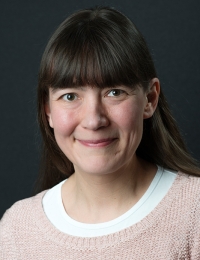Research Secondees

Dr Rebecca Rhead
Rebecca is a Research Associate in the Department of Psychological Medicine, King’s College London. She has a PhD in Social Statistics from the Cathie March Institute, University of Manchester (2015). Rebecca works with survey data and electronic health records to investigate ethnic health inequalities. During the pandemic her research focused on the experiences of NHS staff and how the pandemic has exacerbated and perpetuated existing inequalities for racial and ethnic minority groups in the UK.

Dr Edward Parker
Edward Parker is an Assistant Professor in Systems Biology at the London School of Hygiene & Tropical Medicine. His work explores why vaccines are more effective in some individuals than others, with an emphasis on the potential role of the gut microbiome. During the pandemic, he developed and continues to maintain the LSHTM Vaccine Centre’s COVID-19 vaccine tracker. His current MRC secondment employs electronic health records within the OpenSAFELY platform to explore variation in COVID-19 vaccine uptake and performance among immunosuppressed populations

Dr Yinghui Wei
Yinghui Wei is Associate Professor of Statistics at the University of Plymouth. Her research interests centre on the development of statistical methodology and the applications to medicine, clinical trials, epidemiological studies and evidence synthesis in health. In her MRC fellowship grant, “Using data to improve public health: COVID-19 secondment” , she works within the COVID-19 Longitudinal Health and Wellbeing National Core Study to investigate the effects of COVID-19 infection on health. Specific projects include using electronic health records and cohort studies to understand risk factors for long COVID and to assess the long-term effects of COVID infection on health outcomes. She has experience in conducting COVID research via national Trusted Research Environments, including OpenSAFELY and UK Longitudinal Linkage Collaboration Secure e-Research Platform.

Dr Francisco Perez-Reche
Francisco Perez-Reche is a Senior Lecturer at the Institute of Complex Systems and Mathematical Biology of the University of Aberdeen. He leads the Aberdeen Group for the Mathematics of Infectious Diseases. His research has a marked interdisciplinary character which uses mathematical modelling and data science as core disciplines to address questions relevant to a broad range of fields including infectious diseases, social contagion, phase transitions in disordered systems and dynamical processes in complex networks. During the COVID-19 pandemic, his research informed the Scottish Government, public health teams across Scotland, and the higher education sector. He is seconded to the Department of Twin Research and Genetic Epidemiology at King’s College London, funded by an MRC fellowship. During this secondment, he is working in the COVID-19 Longitudinal Health and Wellbeing National Core Study using metabolomics to better understand COVID-19 symptoms.

Dr Mark Green
Mark Green is a Reader in Health Geography at the University of Liverpool. Their research examines the social and spatial drivers of health inequalities. During their secondment, they are investigating how the COVID-19 pandemic disrupted accessibility to healthcare, including how this disruption has impacted health inequalities

Dr Agz Lemanska
Dr Agz Lemanska has a professional background in pharmacy, having completed her MSc in Pharmacy in 2005. She then completed in 2012 a PhD in Statistics and Machine Learning at the Centre for Chemometrics at the University of Bristol, for which she was awarded a scholarship. She now works as a Senior Lecturer in Healthcare Data Science at the University of Surrey. Her areas of specialism include analysis and linkage of routine healthcare data, and areas of interest include cancer survivorship and mental health. By combining her skills as a pharmacist and statistician, she delivers research projects with the vision of improving the long-term health of the population.

Dr Milla Kibble
Milla Kibble is the Research Facilitator at the Department of Applied Mathematics and Theoretical Physics (DAMTP) at the University of Cambridge. She received her PhD in high dimensional convex geometry and probability theory (Pure Mathematics) from UCL in 2000, and subsequently changed research focus to developing and employing analytics techniques to gain actionable information from large datasets. Her research application area has primarily been in biomedicine and healthcare, with work including probability and graph theory applications to biological data; network pharmacology approaches to provide systems-level insights into the mechanisms of action of natural products; and using multiple data types from monozygotic twins to gain insights into the role of epigenetic effects in obesity. During her MRC funded secondment to the COVID-19 Longitudinal Health and Wellbeing National Core Study, Milla is working with Professor Nic Timpson at the University of Bristol and Dr Claire Steves at KCL to investigate the biological and societal factors behind differential response to COVID-19 vaccination and infection.

Dr Lucy Teece
Lucy is a Lecturer in Medical Statistics in the Department of Health Sciences at the University of Leicester. She was awarded her PhD on “Investigating the presence and impact of competing events in prognostic model research” from Keele University in 2019. Her research interests focus on adapting statistical analysis methods to reflect the more complex realities observed in practice. Lucy has considerable experience in advanced survival analysis methods for developing and validating prognostic models, and linking and analysing large electronic health records data. During the pandemic she worked on projects to identify ethnic health inequalities in UK healthcare workers, and for her MRC secondment she is investigating the long-term effects of COVID-19 infection on cardiovascular, diabetes, and autoimmune health outcomes.